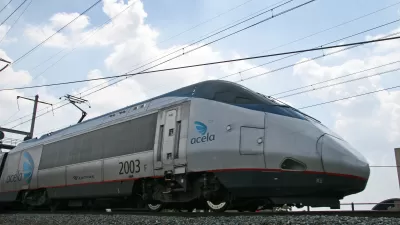The much-maligned rail system is being reconsidered, as gas prices and environmental awareness send people looking for solutions. But can Amtrak step up to the plate?
"The storybook plight of the Little Engine That Could, struggling to make it up a mountain, is a pretty apt metaphor for America's rail system. Limited access, outdated equipment and high ticket prices have been the sorry story of Amtrak, the nation's principal rail carrier, from its beginning pushing most would-be riders to other ways of getting around. But $4-a-gallon gas and chaotic airways are working in Amtrak's favor. In an era when green is hip and mileage matters, trains can't be beat. A diesel locomotive at its most efficient can move a ton of weight 436 miles on a single gallon of fuel, according to the Association of American Railroads, making a full train about 10 times thriftier than your new hybrid. "Hands down, traveling by rail is the most fuel-efficient and least-carbon-intensive way you can go," says Nancy Kete, director of the World Resource Institute Center for Sustainable Transport.
It's a common theme in ecoconsciousness: what used to be the antiquated way of doing things-like growing your own food or harnessing power from wind-is suddenly new again. Amtrak and a handful of commuter rail lines are trying to grab the moment by using environmental friendliness to appeal to new riders and the taxpayers who fund the systems. There are signs the strategy is working. Over the past two years, Amtrak's ridership has increased almost 17 percent systemwide. And the recent spike in gas prices has pushed train ridership to capacity on some routes. A hefty funding package for improvements is currently up for debate in Washington, and Amtrak is already exploring ways to enhance service along popular routes. But getting the system up to speed is a tall order."
FULL STORY: All Eyes on Amtrak

Alabama: Trump Terminates Settlements for Black Communities Harmed By Raw Sewage
Trump deemed the landmark civil rights agreement “illegal DEI and environmental justice policy.”

Study: Maui’s Plan to Convert Vacation Rentals to Long-Term Housing Could Cause Nearly $1 Billion Economic Loss
The plan would reduce visitor accommodation by 25% resulting in 1,900 jobs lost.

Planetizen Federal Action Tracker
A weekly monitor of how Trump’s orders and actions are impacting planners and planning in America.

Wind Energy on the Rise Despite Federal Policy Reversal
The Trump administration is revoking federal support for renewable energy, but demand for new projects continues unabated.

Passengers Flock to Caltrain After Electrification
The new electric trains are running faster and more reliably, leading to strong ridership growth on the Bay Area rail system.

Texas Churches Rally Behind ‘Yes in God’s Back Yard’ Legislation
Religious leaders want the state to reduce zoning regulations to streamline leasing church-owned land to housing developers.
Urban Design for Planners 1: Software Tools
This six-course series explores essential urban design concepts using open source software and equips planners with the tools they need to participate fully in the urban design process.
Planning for Universal Design
Learn the tools for implementing Universal Design in planning regulations.
Caltrans
Smith Gee Studio
Institute for Housing and Urban Development Studies (IHS)
City of Grandview
Harvard GSD Executive Education
Toledo-Lucas County Plan Commissions
Salt Lake City
NYU Wagner Graduate School of Public Service




























